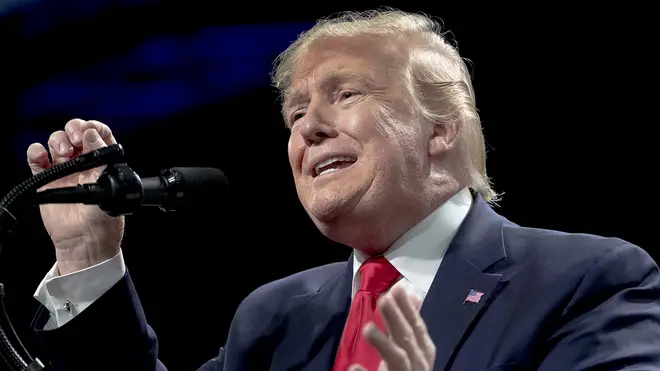
Tom Swarbrick 4pm - 7pm
21 January 2020, 07:05

The historic impeachment trial against Donald Trump will start on Tuesday, setting the stage for only the third trial to remove a sitting president in US history.
The trial comes one month after the House impeached Mr Trump, alleging he abused his presidential power by pressuring Ukraine to investigate Democratic rival Joe Biden, using military aid to the country as leverage.
Chief Justice John Roberts to preside at the trial, administering the oath to senators who will serve as jurors and swear to deliver "impartial justice".
White House lawyers have called for a swift rejection of the "flimsy" charges against the president as final preparations for the trial
Mr Trump's legal team, speaking ahead of the historic impeachment court hearing, argued the president did "absolutely nothing wrong" and urged the Senate to swiftly reject the "flawed" case against him.
"All of this is a dangerous perversion of the Constitution that the Senate should swiftly and roundly condemn," the president's lawyers wrote. "The articles should be rejected and the president should immediately be acquitted."
The rare Senate trial will sit for 12-hour sessions, and some of the Senators who are acting as jurors in the case are in the running to replace Mr Trump as president.
Mr Trump's political campaign dismissed the House effort, which comes during an election year, as "just a failed attempt to politically damage President Trump leading up to his re-election".
Senate Majority Leader Mitch McConnell proposed a condensed, two-day calendar for each side to give opening statements, ground rules that Democrats immediately rejected.
Voting on the Republican leader's resolution will be one of the first orders of business when senators convene on Tuesday. It also pushes off any votes on witnesses until later in the process, rather than upfront, as Democrats had demanded.
House Democrats impeached the president last month on two charges: abuse of power by withholding US military aid to Ukraine as he pressed that country to investigate Democratic rival Joe Biden, and obstruction of Congress by refusing to comply with their investigation.
The Constitution gives the House the sole power to impeach a president and the Senate the final verdict by convening as the impeachment court for a trial.
The first days of the trial are certain to be tangled in motions and procedural debate as both sides attempt to score points. The opening sessions are likely to be held behind closed doors as senators must refrain from speaking during the trial proceedings.
After the four days of opening arguments - two days per side - senators will be allowed up to 16 hours for questions to the prosecution and defence, followed by four hours of debate. Only then will there be votes on calling other witnesses.
At the end of deliberations, the Senate would then vote on each impeachment article.
Mr McConnell had promised to set rules similar to the last trial, of President Bill Clinton in 1999, but his resolution diverged in key ways, which may leave some senators from both parties uneasy.
The White House released documents on Monday ahead of the trial, suggesting the two charges against the president don't amount to impeachable offences. It asserts the impeachment inquiry, centred on Mr Trump's request that Ukraine's president open an investigation into Democratic rival Mr Biden, was never about finding the truth.
House Democrats in their initial court filing over the weekend called Mr Trump's conduct the "worst nightmare" of the founding fathers who framed the Constitution.
But Mr Trump's team contended Monday that even if Trump were to have abused his power in withholding the Ukraine military assistance, it would not be impeachable because it did not violate a specific criminal statute.